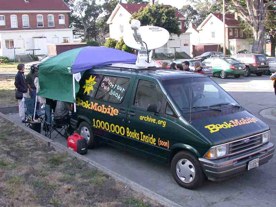I’m pretty apalling at finding and choosing Christmas presents for others, and hence dislike the whole process intensely, so the streamlined nature of online shopping is a real boon, and almost all of our gift-purchasing this year was done via the web. I did have to make one phone call, but I certainly didn’t have to go into any bricks-and-mortar shops!
Not that it would have really been an option – the things I wanted to buy were definitely from the ‘Long Tail‘ and I couldn’t have found any of them in the centre of Cambridge.
Of course, this only works if you don’t adopt my usual practice of waiting until Christmas Eve. Amazon can do some wonderful things, but they can’t deliver as quickly as I can cycle in and out of the town centre.
 But perhaps that will change. Perhaps in future you’ll be able to buy books from your local Barnes and Noble even if they don’t have them on the shelves when you leave home…
But perhaps that will change. Perhaps in future you’ll be able to buy books from your local Barnes and Noble even if they don’t have them on the shelves when you leave home…
On Demand Books is developing the Espresso printing machine – described in this article as ‘an ATM for books’.
The machine can print, align, mill, glue and bind two books simultaneously in less than seven minutes, including full-color laminated covers.
(Thanks to Claes-Frederik Mannby for the link. There’s also more information here.)
 I have here a book that Brewster Kahle gave me, printed on-demand when I visited the Internet Archive a while back. Have a listen to some of his inspiring and entertaining talks, this one, for example, for a different spin on the topic – his motivation is to provide universal access to all human knowledge, and mobile on-demand printing is a part of this.
I have here a book that Brewster Kahle gave me, printed on-demand when I visited the Internet Archive a while back. Have a listen to some of his inspiring and entertaining talks, this one, for example, for a different spin on the topic – his motivation is to provide universal access to all human knowledge, and mobile on-demand printing is a part of this.
But on a larger commercial front, I predict that in the future the boundaries between print & copy outfits like Kinko’s, and bookshops like Borders, will blur dramatically, because the traditional publishing process is inefficient and slow, and, in particular, doesn’t cater for the Long Tail at all well.
One of the books I ordered this Christmas, for example, was Carl Benn’s Historic Fort York, published by a small Toronto-based press. Think about the logistics of getting it from the author’s word-processor in Canada to me here in Cambridge, even after he had gone through the typically tortuous process of getting it accepted by a publisher. Start with the publisher’s decisions about how large a print run made sense, and how much warehouse space would be taken up by as-yet-unpurchased copies sitting in various places around the world. Think about the packaging, the customs processes, the fuel involved in shipping it around the world. Even the weight in the postman’s bag as he brought it to my door.
And compare that entire process with the purely-digital alternative of downloading a PDF.
But as long as we continue to appreciate the aesthetics of reading things on paper, we will always want printing services which are faster, cheaper and higher-quality than we can have at home. And developments like the Espresso machine will be a godsend to a society which values ever more immediate gratification, and, of course, to husbands too disorganised or busy to buy their Christams presents on time.
Barnes & Noble, and Borders, and Waterstones, if they are worried about their rather uncertain future, might do well, I think, to invest heavily in on-demand printing.